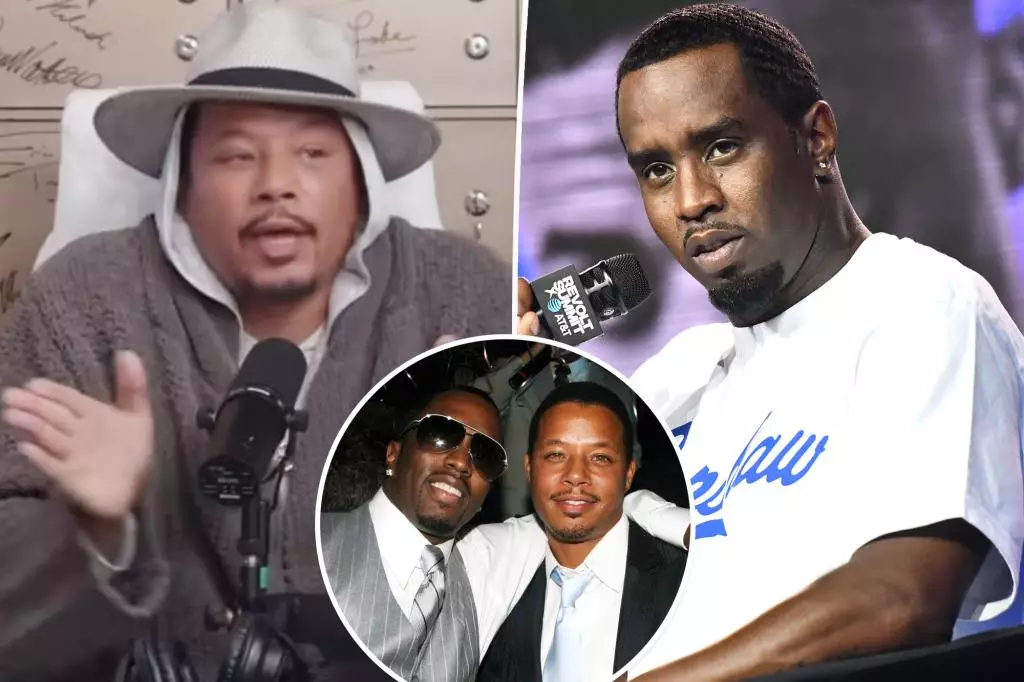Terrence Howard’s recent interview on the “PBD Podcast” has revealed a startling claim that has sent shockwaves through the entertainment industry. The acclaimed actor alleged that Sean “Diddy” Combs, despite his own legal troubles including federal sex trafficking charges, reportedly made unwelcome advances toward him. This admission comes at a time when the music mogul is embroiled in lawsuits pertaining to sexual misconduct. In a world where celebrity encapsulates power, Howard’s testimony sheds light on a concerning underbelly often masked by glamour and success.
Howard’s account paints a vivid picture of his interactions with Combs. He describes being invited into the rapper’s circle under the pretense of mentoring in acting. Howard notes the peculiar atmosphere during these meetings — Combs appeared less interested in the craft and more focused on him as an individual. It raises questions: Were these supposed interactions professional, or did they bear witness to Combs’ notorious reputation? Howard’s insistence that he recognized inappropriate advances came after consulting with his assistant, highlighting a critical moment of self-preservation in an often predatory industry.
Echoes of Misconduct in Hollywood
The entertainment industry has long been a breeding ground for inappropriate behavior, with countless stories emerging from both high-profile and obscure figures. Howard’s experience is not an isolated incident; rather, it resonates with a troubling narrative that has sparked the #MeToo movement. The actor’s bold declaration about needing to protect his own masculinity — which he refers to his “man card” — signifies the societal pressures faced in Hollywood, where male vulnerabilities can lead to the erosion of career opportunities.
No longer is Howard prepared to sacrifice his dignity for the sake of fame or fortune. He mentions having to threaten producers who crossed boundaries in the past, a testament to the toxic environments that some artists must navigate in pursuit of their craft. It forces one to confront the ethos ingrained in Hollywood: the notion that compromise can equate to survival. Howard’s refusal to accommodate inappropriate demands serves as a powerful stand against the normalization of such behavior.
A Provocative Commentary on Masculinity
Howard’s comments dig deeper into societal notions of masculinity and aggression. He claims, “When you approach a real man about his masculinity, you’re going to get a real reaction back,” suggesting that vulnerability can provoke an untenable response, especially in an alpha-dominated culture. In a world where men are often expected to present a façade of strength and dominance, Howard’s convictions challenge these archaic expectations.
Yet, underlying this assertion lies an uncomfortable truth: the notion that sexual intimidation can somehow be deflected through physical strength raises moral questions. Shouldn’t vulnerability be viewed as a facet of strength rather than a flaw? Howard’s refusal to compromise his identity highlights an important conversation — where is the line drawn between professional conduct and sinister motives?
The Ongoing Controversy Surrounding Diddy
As Diddy faces federal charges and a series of lawsuits, Howard’s accusations add another layer of complexity to an already convoluted narrative. The rapper has been vocal in denying all allegations against him, labeling them as fabrications aimed at seeking fame and financial gain. Yet, the sheer volume of claims — both from well-known figures and anonymous individuals — raises a pressing question about the validity and frequency of misconduct within the industry.
Interestingly, Diddy’s own history of attempting to control his narrative, such as when he allegedly interfered with his son’s potential role on “Empire,” speaks volumes about his perceived power over those in his sphere. The intertwining of music rights and familial dynamics illustrates a broader pattern of control that bleeds into the professional realm. As Howard found himself at odds with Diddy years ago, this current revelation not only reopens old wounds but also reflects a potential continuation of a toxic legacy.
The Broader Implications for the Industry
Howard’s brave disclosure contributes to an essential dialogue regarding accountability and the treatment of individuals within the entertainment industry. As a well-recognized figure, his voice carries weight — amplifying the narratives of countless others who may hesitate to speak out against powerful figures. This is more than a story of personal experience; it represents the collective experiences of many who have faced similar predicaments, risking their careers for their self-respect.
In an era where public perception is powerful, Howard’s stance could inspire others to come forward, challenging the norms that perpetuate silence surrounding abuse and misconduct. How can the entertainment sector reshape its culture to create safer environments for all artists? While significant strides have been made, Howard’s experience underscores that there is still a long road ahead in addressing the complexities of power dynamics, masculinity, and ethical integrity in Hollywood.

